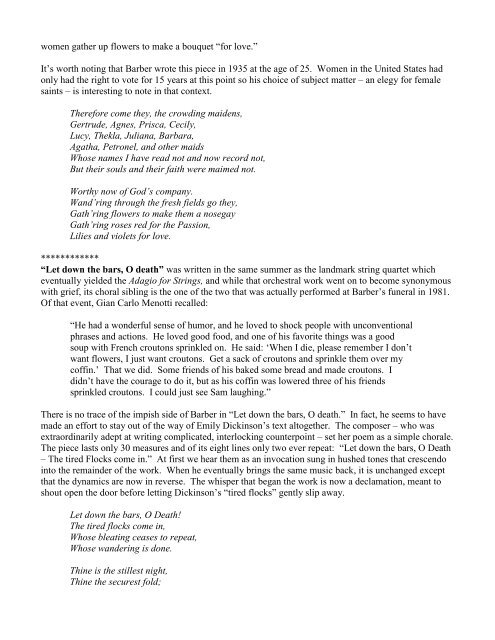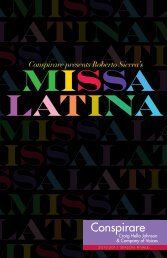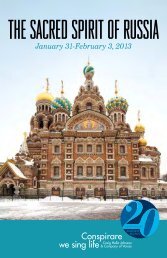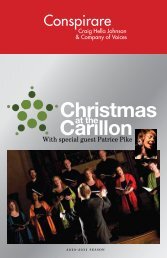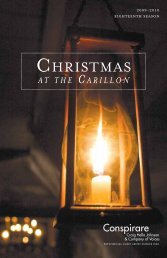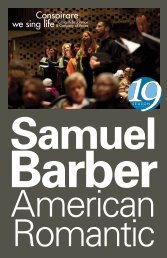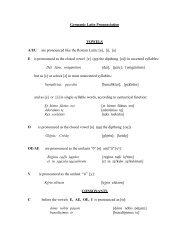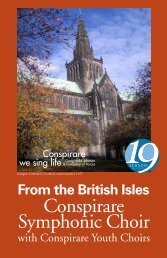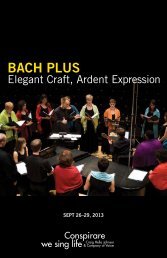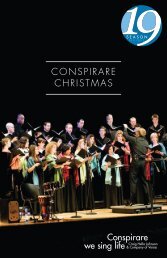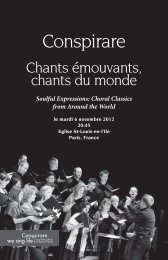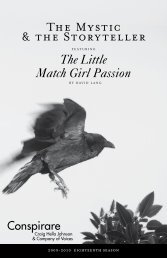PROGRAM NOTES & TEXTS Choral Music of Samuel ... - Conspirare
PROGRAM NOTES & TEXTS Choral Music of Samuel ... - Conspirare
PROGRAM NOTES & TEXTS Choral Music of Samuel ... - Conspirare
Create successful ePaper yourself
Turn your PDF publications into a flip-book with our unique Google optimized e-Paper software.
women gather up flowers to make a bouquet “for love.”<br />
It‟s worth noting that Barber wrote this piece in 1935 at the age <strong>of</strong> 25. Women in the United States had<br />
only had the right to vote for 15 years at this point so his choice <strong>of</strong> subject matter – an elegy for female<br />
saints – is interesting to note in that context.<br />
Therefore come they, the crowding maidens,<br />
Gertrude, Agnes, Prisca, Cecily,<br />
Lucy, Thekla, Juliana, Barbara,<br />
Agatha, Petronel, and other maids<br />
Whose names I have read not and now record not,<br />
But their souls and their faith were maimed not.<br />
Worthy now <strong>of</strong> God’s company.<br />
Wand’ring through the fresh fields go they,<br />
Gath’ring flowers to make them a nosegay<br />
Gath’ring roses red for the Passion,<br />
Lilies and violets for love.<br />
************<br />
“Let down the bars, O death” was written in the same summer as the landmark string quartet which<br />
eventually yielded the Adagio for Strings, and while that orchestral work went on to become synonymous<br />
with grief, its choral sibling is the one <strong>of</strong> the two that was actually performed at Barber‟s funeral in 1981.<br />
Of that event, Gian Carlo Menotti recalled:<br />
“He had a wonderful sense <strong>of</strong> humor, and he loved to shock people with unconventional<br />
phrases and actions. He loved good food, and one <strong>of</strong> his favorite things was a good<br />
soup with French croutons sprinkled on. He said: „When I die, please remember I don‟t<br />
want flowers, I just want croutons. Get a sack <strong>of</strong> croutons and sprinkle them over my<br />
c<strong>of</strong>fin.‟ That we did. Some friends <strong>of</strong> his baked some bread and made croutons. I<br />
didn‟t have the courage to do it, but as his c<strong>of</strong>fin was lowered three <strong>of</strong> his friends<br />
sprinkled croutons. I could just see Sam laughing.”<br />
There is no trace <strong>of</strong> the impish side <strong>of</strong> Barber in “Let down the bars, O death.” In fact, he seems to have<br />
made an effort to stay out <strong>of</strong> the way <strong>of</strong> Emily Dickinson‟s text altogether. The composer – who was<br />
extraordinarily adept at writing complicated, interlocking counterpoint – set her poem as a simple chorale.<br />
The piece lasts only 30 measures and <strong>of</strong> its eight lines only two ever repeat: “Let down the bars, O Death<br />
– The tired Flocks come in.” At first we hear them as an invocation sung in hushed tones that crescendo<br />
into the remainder <strong>of</strong> the work. When he eventually brings the same music back, it is unchanged except<br />
that the dynamics are now in reverse. The whisper that began the work is now a declamation, meant to<br />
shout open the door before letting Dickinson‟s “tired flocks” gently slip away.<br />
Let down the bars, O Death!<br />
The tired flocks come in,<br />
Whose bleating ceases to repeat,<br />
Whose wandering is done.<br />
Thine is the stillest night,<br />
Thine the securest fold;


